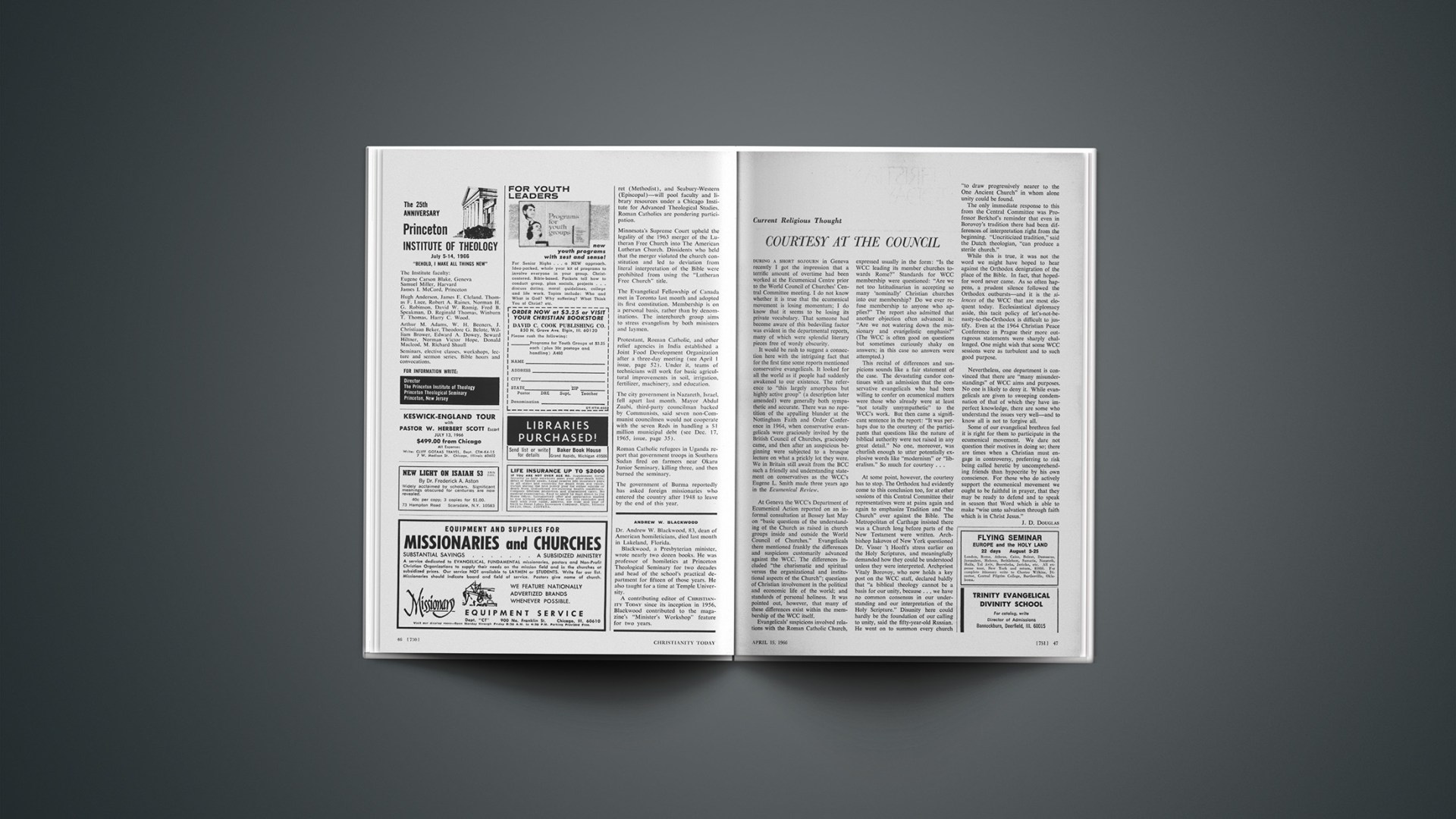During a short sojourn in Geneva recently I got the impression that a terrific amount of overtime had been worked at the Ecumenical Centre prior to the World Council of Churches’ Central Committee meeting. I do not know whether it is true that the ecumenical movement is losing momentum; I do know that it seems to be losing its private vocabulary. That someone had become aware of this bedeviling factor was evident in the departmental reports, many of which were splendid literary pieces free of wordy obscurity.
It would be rash to suggest a connection here with the intriguing fact that for the first time some reports mentioned conservative evangelicals. It looked for all the world as if people had suddenly awakened to our existence. The reference to “this largely amorphous but highly active group” (a description later amended) were generally both sympathetic and accurate. There was no repetition of the appalling blunder at the Nottingham Faith and Order Conference in 1964, when conservative evangelicals were graciously invited by the British Council of Churches, graciously came, and then after an auspicious beginning were subjected to a brusque lecture on what a prickly lot they were. We in Britain still await from the BCC such a friendly and understanding statement on conservatives as the WCC’s Eugene L. Smith made three years ago in the Ecumenical Review.
At Geneva the WCC’s Department of Ecumenical Action reported on an informal consultation at Bossey last May on “basic questions of the understanding of the Church as raised in church groups inside and outside the World Council of Churches.” Evangelicals there mentioned frankly the differences and suspicions customarily advanced against the WCC. The differences included “the charismatic and spiritual versus the organizational and institutional aspects of the Church”; questions of Christian involvement in the political and economic life of the world; and standards of personal holiness. It was pointed out, however, that many of these differences exist within the membership of the WCC itself.
Evangelicals’ suspicions involved relations with the Roman Catholic Church, expressed usually in the form: “Is the WCC leading its member churches towards Rome?” Standards for WCC membership were questioned: “Are we not too latitudinarian in accepting so many ‘nominally’ Christian churches into our membership? Do we ever refuse membership to anyone who applies?” The report also admitted that another objection often advanced is: “Are we not watering down the missionary and evangelistic emphasis?” (The WCC is often good on questions but sometimes curiously shaky on answers; in this case no answers were attempted.)
This recital of differences and suspicions sounds like a fair statement of the case. The devastating candor continues with an admission that the conservative evangelicals who had been willing to confer on ecumenical matters were those who already were at least “not totally unsympathetic” to the WCC’s work. But then came a significant sentence in the report: “It was perhaps due to the courtesy of the participants that questions like the nature of biblical authority were not raised in any great detail.” No one, moreover, was churlish enough to utter potentially explosive words like “modernism” or “liberalism.” So much for courtesy …
At some point, however, the courtesy has to stop. The Orthodox had evidently come to this conclusion too, for at other sessions of this Central Committee their representatives were at pains again and again to emphasize Tradition and “the Church” over against the Bible. The Metropolitan of Carthage insisted there was a Church long before parts of the New Testament were written. Archbishop Iakovos of New York questioned Dr. Visser ’t Hooft’s stress earlier on the Holy Scriptures, and meaningfully demanded how they could be understood unless they were interpreted. Archpriest Vitaly Borovoy, who now holds a key post on the WCC staff, declared baldly that “a biblical theology cannot be a basis for our unity, because … we have no common consensus in our understanding and our interpretation of the Holy Scripture.” Disunity here could hardly be the foundation of our calling to unity, said the fifty-year-old Russian. He went on to summon every church “to draw progressively nearer to the One Ancient Church” in whom alone unity could be found.
The only immediate response to this from the Central Committee was Professor Berkhof’s reminder that even in Borovoy’s tradition there had been differences of interpretation right from the beginning. “Uncriticized tradition,” said the Dutch theologian, “can produce a sterile church.”
While this is true, it was not the word we might have hoped to hear against the Orthodox denigration of the place of the Bible. In fact, that hoped-for word never came. As so often happens, a prudent silence followed the Orthodox outbursts—and it is the silences of the WCC that are most eloquent today. Ecclesiastical diplomacy aside, this tacit policy of let’s-not-be-nasty-to-the-Orthodox is difficult to justify. Even at the 1964 Christian Peace Conference in Prague their more outrageous statements were sharply challenged. One might wish that some WCC sessions were as turbulent and to such good purpose.
Nevertheless, one department is convinced that there are “many misunderstandings” of WCC aims and purposes. No one is likely to deny it. While evangelicals are given to sweeping condemnation of that of which they have imperfect knowledge, there are some who understand the issues very well—and to know all is not to forgive all.
Some of our evangelical brethren feel it is right for them to participate in the ecumenical movement. We dare not question their motives in doing so; there are times when a Christian must engage in controversy, preferring to risk being called heretic by uncomprehending friends than hypocrite by his own conscience. For those who do actively support the ecumenical movement we ought to be faithful in prayer, that they may be ready to defend and to speak in season that Word which is able to make “wise unto salvation through faith which is in Christ Jesus.”










